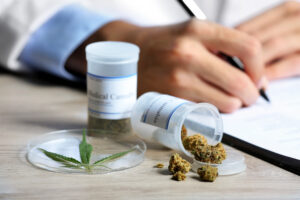

It is usually not difficult to identify when a person is drunk. On the same notion, a person getting drunk once in a while doesn’t necessarily signal a problem. If this behavior were to persist, however, then additional support may very well be needed. Diamond Recovery’s alcohol rehab in Florida is dedicated to providing tailored treatment programs designed to address each client’s individual needs. With a focus on holistic healing and supported by a team of experienced professionals, we aim to guide individuals toward a path of sobriety and personal growth.
Alcohol addiction, often known as alcoholism, is a multifaceted illness influenced by biological, psychological, and social variables. Addressing and managing this widespread problem requires an understanding of the factors that contribute to alcohol’s addictive traits.
Alcohol has a biological impact on the chemistry of the brain, especially on neurotransmitters like dopamine that are essential to the brain’s reward system. The effects of alcohol on dopamine, which results in happy and euphoric feelings, make it a major contributor to the development of alcoholism. The brain’s reward system may alter over time as a result of repeated alcohol exposure, becoming less sensitive to natural rewards and adapting to alcohol’s presence. Tolerance is a characteristic that frequently causes people to drink more alcohol to get the same results, which can develop into addiction.
Alcoholism can be caused by a variety of psychological factors, including stress, trauma, or co-occurring mental health illnesses such as depression or anxiety. Many people use alcohol as a coping strategy to temporarily escape from life’s hardships or to lessen negative feelings. However, relying on alcohol to cope can lead to a cycle of addiction, as people may become psychologically reliant on its effects to manage stress or emotional pain.
Social factors also contribute to the addictive nature of alcohol. Peer pressure, cultural norms surrounding alcohol consumption, and societal acceptance of drinking can all influence an individual’s relationship with alcohol. Additionally, environmental cues and triggers, such as social gatherings or advertising, can reinforce drinking behavior and make it harder for individuals to resist the urge to consume alcohol.
In summary, alcohol addiction is multifaceted, with biological, psychological, and social factors all playing a role in its development. By understanding these underlying mechanisms, our Florida alcohol rehab can tailor your treatment to address the specific needs of individuals struggling with alcohol addiction, offering hope for recovery and a path toward lasting sobriety.
This is perhaps the question related to alcoholism we are asked most often. How can I tell if I or someone else has alcoholism? While only a medical professional can formally diagnose an alcohol use disorder, there are certain signs you can look for and questions you can ask, which will give you a pretty good idea if alcohol addiction is likely to present.
Below are listed 15 potential signs of alcoholism (alcohol use disorder). If you see more than 2 or 3 of these in yourself or someone you care about, it is an excellent indication that alcohol addiction treatment should be at least considered.
Recognizing the signs of alcoholism, also known as Alcohol Use Disorder (AUD), is crucial for early intervention and seeking appropriate treatment. AUD is a chronic relapsing brain disease characterized by compulsive alcohol use, loss of control over drinking, and negative emotional states when not using alcohol. Below are 15 signs that may indicate the presence of alcoholism, shedding light on the diverse ways this disorder manifests in individuals’ lives.
If you or someone you know is experiencing several of these signs, it may indicate the presence of alcoholism, and seeking professional help is advised. With our Florida alcohol addiction treatment program, recovery from alcohol abuse is possible, leading to a healthier, more fulfilling life free from the grips of alcoholism.

Yes, alcoholism (alcohol use disorder) is considered a disease according to the American Medical Association, the Diagnostic and Statistical Manual of Mental Disorders, and the majority of the medical community. The current edition of the DSM (DSM-5) classifies alcoholism (now referred to as Alcohol Use Disorder) as a chronic disease.
The disease model of alcoholism was first proposed by Dr. William Silkworth of NYC’s Towns Hospital in the early 1930s. Dr. Silkworth is perhaps best known as the author of The Doctor’s Opinion foreword in the Alcoholics Anonymous textbook. NYC’s Towns Hospital was a well-known “drying out place” in the early 20th century, where people with serious alcohol use disorders would go in the hopes of getting sober.
But it wasn’t until Dr. Silkworth partnered with Bill Wilson and Dr. Bob Smith, the co-founders of Alcoholics Anonymous, that they began to see real success in helping people get sober and stay that way for meaningful lengths of time. This is when and where the addiction recovery movement was born. For the first time, there was real hope for people stuck in a cycle of excessive drinking and despair.
Treatment for alcohol addiction most often begins with an inpatient medical detox to stabilize the patient and get them safely and comfortably through the alcohol withdrawal process. Once the patient is stabilized and comfortable, they can enter residential alcohol addiction treatment, also known as inpatient treatment. During inpatient care at our rehab in Florida, they will still have 24-hour staff support but will no longer need detox protocol and can attend therapy. Following inpatient treatment, patients can progress to PHP, IOP, and finally, outpatient treatment.
This phase of treatment is focused on medically stabilizing the patient. Unsupervised, unmedicated alcohol withdrawal can be hazardous. Alcohol is one of only three categories of drugs that have potentially fatal withdrawal symptoms. The other two are benzodiazepines and barbiturates. No one should ever attempt to detox themselves from alcohol or stop drinking abruptly without medical supervision. It can be dangerous or even deadly in some cases. We encourage those in this situation to contact us at our Florida detox center today.
This is where the rubber meets the road, you might say. In residential treatment, patients attend individual, group, and specialty therapy as well as 12-step fellowship groups. Alcoholism treatment during this phase is full-time, and patients sleep overnight in a facility with 24-hour clinical staff (that’s what makes this inpatient treatment). Not every alcohol rehab facility offers residential treatment, so it’s good to ask about it specifically if it’s something you want.
When a patient completes residential alcohol treatment, then can move on to one of our partial hospitalization programs (PHP). PHP treatment for alcohol use disorder is similar to residential treatment in that it consists of full-time treatment —- you get treatment from morning to afternoon/evening, 5 days a week. The primary difference is that it is an outpatient treatment. This means that patients no longer sleep overnight in a medical facility with 24-hour clinical supervision. PHP is a “step-down” from residential/inpatient alcohol rehab.
When a patient completes residential alcohol treatment, they can move on to one of our intensive outpatient programs (IOP). An IOP is similar to PHP. The main difference is the number of treatment hours per week. Whereas a PHP is a full-time treatment program, leaving little time for anything else – IOP is a part-time treatment program. Usually 2-3 days a week for a half-day. This makes it possible to return to work or school on a reduced schedule while continuing treatment in some cases.

One important thing to bear in mind when searching for alcoholism treatment in Georgia, California, or anywhere else in the U.S. is that not every program offers a complete continuum of care. Many facilities, for example, do not operate their medical detox on-site. They will refer patients out to a third-party alcohol detox for that first part of treatment.
Unfortunately, some alcohol rehabs aren’t entirely upfront and transparent about this, so it’s an important thing to ask about. Still, other programs do not offer residential inpatient treatment but a partial hospitalization program (PHP) with supportive housing.
It is, of course, possible to get good treatment for alcoholism at a facility that outsources its medical detox phase of care or even one that does not offer inpatient treatment for alcohol use disorders. The most important thing is that you approach shopping for alcohol treatment as an educated consumer with the facts at hand and that any treatment center you work with is upfront about the services they offer.
For several reasons, many patients and their families prefer programs that operate their own in-house inpatient medical detox. Namely, having all of your treatment under one program avoids any need to be discharged from one program, admitted to another, and shuttled around town. Not every patient requires inpatient residential alcohol addiction treatment, but many do benefit from having this phase of care before entering PHP (outpatient) care.
Choosing the right alcohol rehab in Florida requires careful consideration of several key factors. Ensure clarity on whether the facility conducts medical detox in-house or outsources it, and verify the quality of the detox center if it’s outsourced. Clarify the levels of care offered, prioritize licensed and reputable programs, and be wary of unrealistic promises or illegal enticements. Trust your instincts, ask questions, and conduct thorough research to make an informed decision about the best treatment center for yourself or your loved one’s journey to recovery.
The decision to seek help for a drinking problem is often difficult. People rarely want to face the fact that they, or someone they love, have lost the power of choice when it comes to alcohol. But the fact that you’re here right now, reading these words, means that there is an opportunity. A chance to stop the course of this disease in its tracks and change the future. Allow our Florida rehab facility to give you the support you need and deserve.
Diamond Recovery stands ready to help you or your loved one take on alcohol and win. All it takes to make your start is a phone call. If you’re ready for change, please give us a call at (844) 909-2525.





Creating foundations of solution for those suffering from substance use disorders.
Licensed by the State Department of Health Care Services
License: 191117AP
Expires: 01/31/2026
© Diamond Recovery 2024
About Us
Quick Links